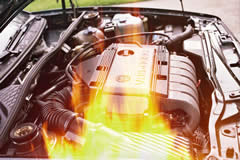Prevent Cooling System From Being Sick - Vol.254
Your car cooling system is amongst the most important aspects of your car and is absolutely vital to keeping the car running properly. Maintaining the system will ensure that your car runs for a longer period of time and will also keep it out of the garage and away from costly repairs.
Before we get into the things you need to do to prevent the cooling system from being sick it's important to be able to identify the symptoms of a sick cooling system. If your car is displaying any of the following you should get it to the nearest garage as soon as you can so that it can be repaired and not cause any further damage to the vehicle.

The symptoms
There are four easily recognizable symptoms that you can check that will let you know if there is a problem with the cooling system in the car. They are as follows:
Overheating
This is the most obvious issue to look out for. The entire purpose of your car's cooling system is to keep the various parts of the vehicle from overheating. Thus, if you notice that your car is prone to overheating this is a sure fire sign that the system is sick. Check the bonnet on a regular basis and keep tabs on the vehicle's overall health. If it is overheating then you need to get repairs for the system else it will eventually cause more problems with the parts that need to be kept cool.
Leaks
Leaks are often a symptom of a sick cooling system, so if you notice that there are puddles of fluid being left by the car, either when in use or stationary, be sure to get it checked out. If your car is leaking coolant it can't use it to keep the rest of the vehicle cool, which in turn leads to overheating or the need to repeatedly add coolant to the system.
Smell
As odd as it may seem, you can often detect if the cooling system is sick by simply smelling the air around you when driving. If you notice a slightly sickly sweet smell in the air then you may have an issue. This smell is often caused by antifreeze, which is dangerous to breathe in over long periods and is required by the cooling system. Again, take the car to the garage if you suspect something is awry.
Adding lots of coolant
This point bleeds into the leaking issue mentioned earlier, but can also be a sign that the cooling system is becoming less efficient. If you find that you are having to add coolant on a much more regular basis than before then this indicate a problem with the system. Check the owner's manual to get an idea of how regularly the coolant should be topped up and then compare it to your own use.
Inspections
You can catch problems early by maintain the system and checking it often. You should look out for the following issues at all times:
- Conduct visual inspections of all of the hoses, belts and the radiator. Be on the lookout for cracks, holes and other damage that may be causing the system to run poorly.
- Also check hoses for uncharacteristic bulges. These suggest that there may be a blockage in the hose that needs to be remedied.
- Keep an eye on the temperature gauge inside the vehicle. Every car has a "danger zone", which is the temperature where it becomes unsafe to operate the vehicle. If you find your car is heating that sort of temperature on a regular basis you should look to fix to cooling system.
- Hissing sounds and steam emanating from the engine are also sure-fire ways of detecting that the engine is hot. Keep an eye on the bonnet while you're driving and get the vehicle repaired if you notice any of these signs.
A sick cooling system can cause a myriad of other problems with your vehicle if not remedied quickly. Be on the lookout for the tell-tale symptoms and remain vigilant with your maintenance and you should be able to keep the car running for many years to come.